Kirkus Reviews are expensive. I’ve paid for a few with the hope that the review will land on more eyeballs and generate more sales. The side hope is that a book will be chosen to be featured and get libraries and bookstores interested. So far none of the reviews have gained much traction for any of the books.
Kirkus Reviews structure their reviews in this way: There’s a one-line summary of the book at the top, then a paragraph or two which constitutes the bulk of the review, and finally a one-line summary of the review itself—sort of a tag line. My biggest complaint about all of the reviews i’ve gotten is that they tend to be mostly description of the plot rather than what the emotional resonance of the book is. read on for specific commentary.
Ryder, Sky, and Emmaline
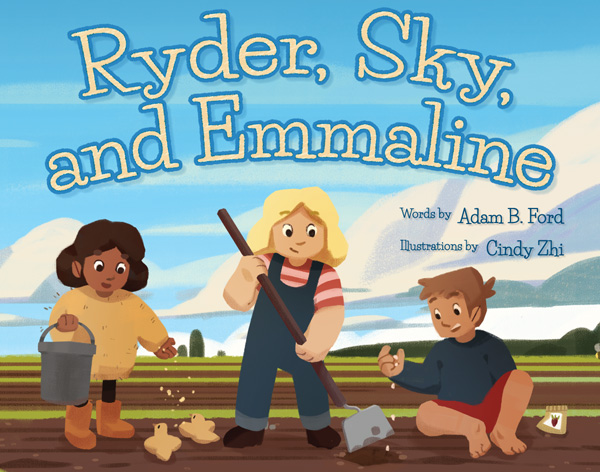
Children spend the day on a farm in Ford’s rhyming picture book.
Ryder, Sky, and Emmaline enjoy completing tasks like picking veggies for lunch, tending crops, helping the “farmer pull the plow,” and more. They visit the farm’s animal residents, including cows and pigs, and have fun running around fields, playing on the swing at the pond, and creating hay mazes. After they finish their chores, the kids visit the “cool and leafy glade,” where they picture themselves in fantasy scenarios. Sky imagines gazing at underwater creatures from a submarine window, and Emmaline pretends she’s an astronaut zooming in space. When the sun sets, the kids are greeted by dogs who have come to escort them home. While many farm books are largely concept stories focusing solely on chores, Ford offers insight into teamwork and friendship as the pals work together. The rhyme scheme has a playful meter, which will keep readers interested (“Scatter chicken feed around / Dig up beets from underground”). Zhi provides colorful cartoonlike illustrations of the children, who show a diverse range of skin tones. Readers will appreciate the vibrant background scenery, like a multihued sunset.
A pleasant depiction of bucolic life emphasizing camaraderie and community.
—Kirkus Reviews
This is a pretty good review, even though it is mostly plot description. The actual meat of the review doesn’t start until the line “While many farm books…” and it is positive, but the reviewer seems more concerned with the technical aspects of the story (rhyme scheme, “insight into teamwork,” “diverse range of skintones”) rather than what i hoped would be the overall feel of the story. To me, the book echoes the same non-story slice-of-life similar to the books by Robert McCloskey, where the plot isn’t as important as the place setting and the vibe from that setting. Oh well, not bad.
South Side of the Sea
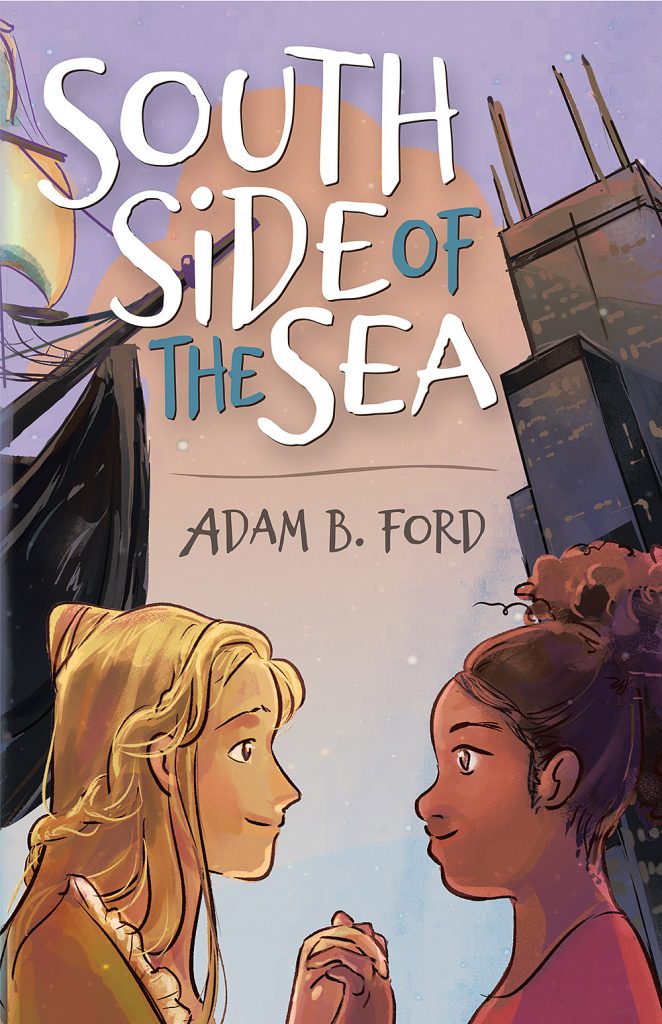
Ford offers a time-hopping YA adventure about two teenage girls who form a close friendship, despite living more than three centuries apart.
In 2019 on the South Side of Chicago, Kalea is a 14-year-old Black girl who has her fair share of troubles. She’s getting poor grades in school, largely because of undiagnosed dyslexia, and her family seems to have no faith in her ability to improve; in addition, she regularly deals with harassment from racist cops. But after she begins hearing sounds of the ocean in her head, along with French-speaking crewmen aboard a ship, she gradually comes to realize that she has a strange, unexplainable connection with a girl from the distant past: Analicia DuMont, the 14-year-old White daughter of a captain of a ship—one that headed to the New World back in 1686. As the two girls come to accept their strange situation and get to know each other, they become the best of friends, and they help each other maneuver through their lives. Over the course of this novel, Ford effectively details the incredibly different cultures that his characters inhabit, and the wisdom that readers will glean from the girls’ interactions is profoundly moving—particularly when it comes to issues of gender and racial inequality. Ford shows Analicia’s life traveling on the Caribbean Sea to be harrowing—her father is killed, she’s kidnapped by pirates, and she must survive battles at sea—and Kalea’s modern-day existence is shown to be just as dangerous; one of her friends is shot and killed by police and her own life is endangered when she participates in a peaceful protest. The author also includes a bombshell plot twist at the end of the story that’s impressive.
A heartwarming fantasy tale that should appeal to young and old readers alike.
—Kirkus Reviews
This is a good review as well, but again, lots of plot description, almost to the point of having spoilers. I had found it difficult to write catchy write-ups of this book because i wanted the reader to discover the connection between the two main characters without knowing what was coming. I really don’t have any complaints as to the substance of the review, except for the reviewer’s decision to call the ending of the book a “plot twist.” There was no twist, it was simply the logical conclusion of the situation. Surprising perhaps, but definitely not a “twist.” Still, cool that they liked it.
This book was chosen to be featured (for some additional $$$) as an Indie book to watch for, which is nice, but the next book ↓ had a better review….
The Alphabet from AAARRGH! to ZZzzz…
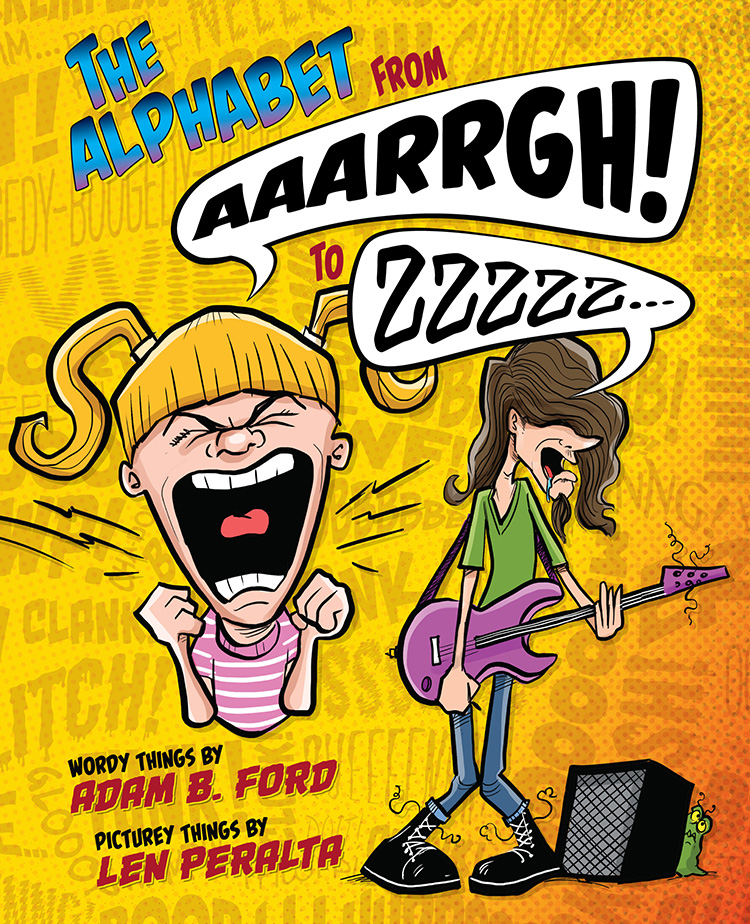
Sound effects span the alphabet in Ford’s comedic concept book.
This book describes each letter of the alphabet—and a few diagraphs, such as ch and th—using both familiar and unusual sound effects. A few sounds are words readers might find in the dictionary (clank, glitch), but many are invented; “E is for ERT!” for example—the sound that a car’s brakes make. In each case, the spelling emphasizes how a person might sound out the strange sound effect, helped along by chosen fonts: “SKLORSH!” the sound of wet sneakers, is depicted in a gooey, dripping typeface, while the “VVVIP!” of an alien vessel has an appropriately science-fictional look. Ford’s rhymes are rhythmic and fun to read aloud, and the inclusion of diagraphs makes this a good choice for emergent readers despite some challenging vocabulary. For instance, the book effectively highlights the difference in sounds between t and th: “THOK! When you’re chopping a log and you give it a whock.” Each page features a humorous black-and-white cartoon from illustrator Peralta; their sharp contrast, precise linework, and vivid humor will grab young readers’ attention. The overall effect is reminiscent of Shel Silverstein’s works, offering adults a sense of nostalgia while sharing the book with kids.
A delightfully clever read-aloud that will elicit noisy giggles.
—Kirkus Reviews
“Concept book”? This is probably the best review of any of my books, but it seemed to pass under Kirkus’s radar. Sure, there are tons of alphabet books out there, but i’ve never seen one like this. Props to the reviewer for educating me on what a digraph is (i just knew that i wanted to add the compound sounds like TH and SH). This seems to be a good example of how even a good professional review doesn’t really help much if nobody can find your book. I mean, i was compared to Shel Silverstein! That should account for something!
Nonny, Book One: Unshown
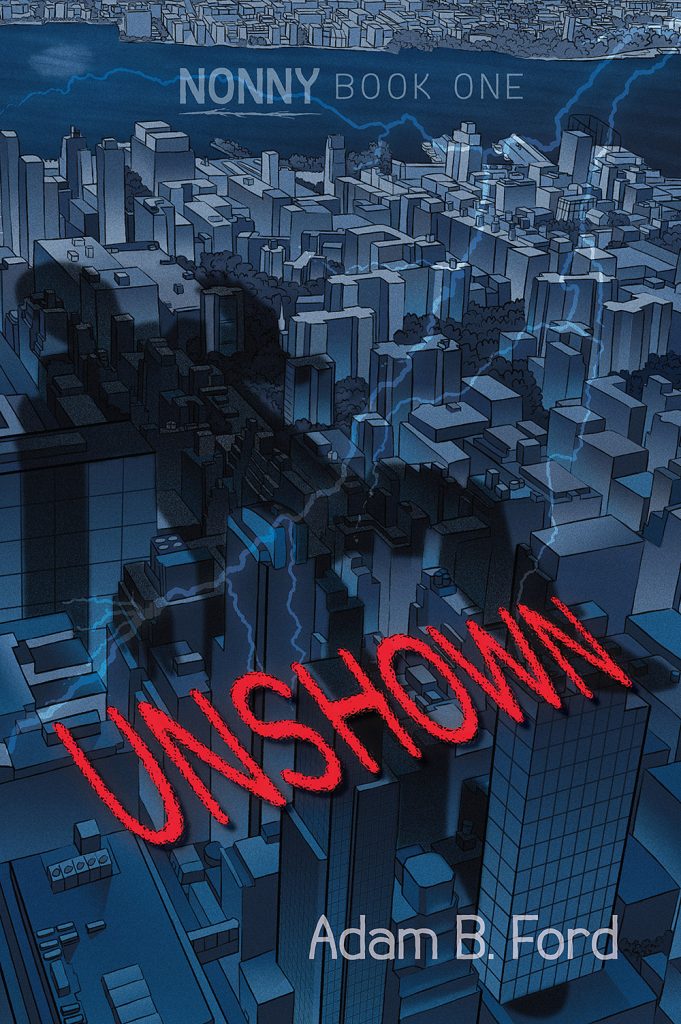
In Ford’s YA SF novel, a powerless teenage girl in a world of superpowered people witnesses a man’s violent death and starts an investigation.
Paley Curtis hasn’t yet figured out where her “talent” is. Talents are supernatural abilities that nearly everyone has; they include such things as bioluminescence, sharper senses, and many others. Even her younger brother, Zed, has figured out that he can heal others. Paley is starting to worry that she will never have a talent; her older sister, Mera, has started telling her that she’s “probably a nonny”—a derogatory term for someone with no talents at all. While leaving the library one day, Paley sees a man levitating off the ground, surrounded by police officers; he’s gunned down by the cops seconds later for no clear reason. Afterward, Paley can’t get the incident out of her head, and she decides to find out more about the dead man. First, she calls a police public-relations person for more information but without much success; then she visits City Hall and the victim’s apartment. She discovers that the man, Harris Waltz, had dealings with Dillon Cray Engineering, her father’s former employer—and that DCE seems to have been involved in some shady dealings. With the help of friends, the inquisitive, unpowered Paley keeps digging into the mystery of why Waltz was gunned down—but learning the truth could put her in grave danger. In this novel, Ford intriguingly lays out a world where superpowers are the norm, and a seemingly ordinary human seems to be the odd one out. Refreshingly for the genre, these powers are just an everyday part of people’s lives, casually woven into the story, and the relatable main character spends the book wistfully hoping for her own. The novel’s pacing is occasionally slowed by unnecessary detail and lengthy interactions between characters, including excessive information about sports or Paley’s friends’ family lives. Overall, though, the curious mystery and compelling worldbuilding is enough to make this a worthwhile read.
A solid, offbeat superhero tale in which a girl draws on her investigative talent.
—Kirkus Reviews
Nonny, Book Two: Unfound
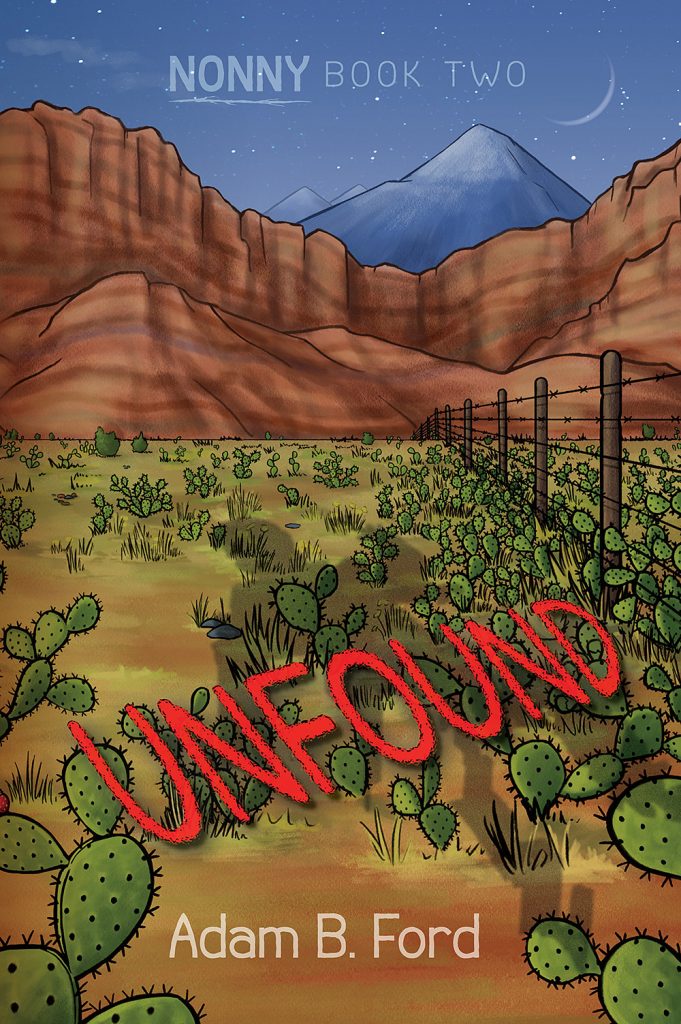
A teen who lacks superpowers (which everyone else has) turns amateur sleuth to investigate a murder in this second installment of Ford’s YA series.
Paley Curtis’s last summer before beginning high school in the city of Russellville isn’t terribly exciting. Her job is boring, and she lives with a family of six in a scorching, unairconditioned apartment. By the age of 15, Paley’s “talent” should have revealed itself, but unlike her peers, she still has no supernatural ability. Even so, she investigates a fatal shooting she witnessed some time ago, though she didn’t see the shooter. In the course of her sleuthing, Paley notices someone following her wherever she goes—three someones, actually. She suspects they’re spies for Dillon-Cray Engineering executive Stan Lemmelson, who believes she’s a “sparkie” able to generate electricity. She’s not, but her best friend, Jen, is; so Paley keeps quiet to protect her. The savvy, resourceful Paley has to worry about herself, too, when she is targeted for abduction. Ford’s story, which includes copious nods to past events and characters, assumes readers are familiar with the previous book in this series. The adolescent hero is immensely likable, persistent, and coolheaded as she evades the followers on her trail. Paley’s most notable villain is a school bully, and there’s clearly trouble in her parents’ marriage, quotidian concerns more compelling than the fantastical superpowers on display. Paley’s murder case doesn’t fully engage, in part because it’s a carryover from the last entry in the series. Nevertheless, Ford’s effervescent passages propel the story and conjure lyrical moments, as when Paley is caught in a storm with her romantic interest: “Car-sized wisps of cloud were flying down the dirt road, following the contours of the ground.” This sequel, with its decisive conclusion, implies the series’ end.
A genre-bending mystery at its best when showcasing its relatable young protagonist.
—Kirkus Reviews
These two reviews should be by the same reviewer, although i don’t have any way to verify that. I was disappointed with these reviews. I put a lot of time and effort into these two books (which are, yes, one long story) and i felt that the reviewer didn’t “get” them at all. Granted, i’m not a fluid metaphor-heavy writer and my prose tends to be much more plot and action oriented than description oriented, but still, i wouldn’t mind a meh review if the reviewer actually understood the books. I realize that these reviewers read a lot, so expecting memory retention of two whole novels might be unwarrented, but i did pay a lot for these reviews and these are supposedly professional reviewers.
To nitpick, i don’t feel that there’s any need to be so specific with character names and company names and how many people are spying on Paley. This seems like unnecessary minutiae at the expense of broader themes which are somewhat ignored. Sloppy reviewing—unprofessional.
Anyway, the review of book one: Again, lots of plot description, but the write-up tended toward what happens early on in the book, leaving out much of Paley’s interactions with her friends. I love the line “Refreshingly for the genre, these powers are just an everyday part of people’s lives, casually woven into the story” because that is exactly what motivated this book—the overabundance of main characters in YA fiction who have some special power. I wanted my protagonist to have no powers.
The reviewer shows their hand as a book-nerd in a way at the end of this review, stating that “The novel’s pacing is occasionally slowed by … excessive information about sports.” There’s very little about sports, but Paley’s best friend Jen is an athlete and plays sports and that’s what she does and it’s a part of her life and therefore it’s a tangential part of Paley’s life. Besides, Paley is growing as a person as the novel progresses and she is enticed toward a sport because her mentor plays it. Harry Potter played way more sports than Paley does.
Book two: First, let me just list the errors in the review. The city is not called Russellville; it is unnamed. Paley lives in a neighborhood of the city called Russellville, and in fact, in this book, more than half of the plot takes place in other towns and neighborhoods. Paley does not get caught in a storm with her romantic interest because Ti is not her romantic interest. Ti likes Paley in that way, but the feelings are not mutual—they are best friends and nothing beyond that. Perhaps this reviewer was reading too hastily.
There are a couple of good quotes in this review, but again, too much plot description and not enough overall feeling of the book. Also, i don’t know what the reviewer was expecting, but these two books are essentially one single whole and the reviewer spends a fair amount of words complaining that issues from the first book are assumed in the second. Yes, read the first one first. I mean, come on. And what’s with the word quotidian?
Overall, Kirkus Reviews are good, as in, they present the books in a favorable light. There are great little bits of sentences throughout the reviews that can be cherry-picked to imply a rave even if there are less-than satisfying parts of the reviews as well. My biggest issue with all of them is that they are expensive and not thorough. It seems like the longer a book is, the more gets missed and the reviewers seem to be more set on a coherent plot description than a deep dive into the underlying motivations and meanings of the stories. I know that i may be asking a lot for a reviewer to “get” what i’m driving at in a particular story, but given that they review many books (dozens? hundreds?) it seems that they would see what’s different in a story and home in on that, using it to set up the narrative structure of the review.
But i’m not much of a reviewer, i guess.
0 Comments